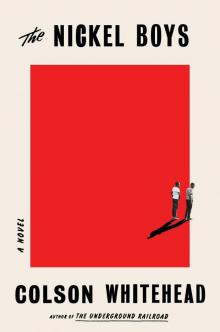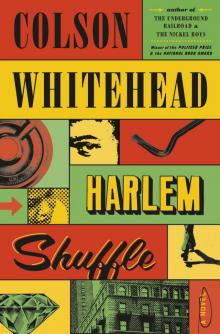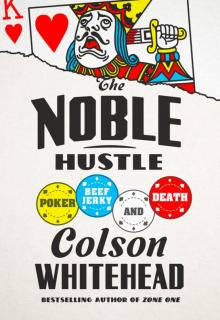- Home
- Colson Whitehead
The Underground Railroad Page 3
The Underground Railroad Read online
Page 3
Chester panted, hands on his knees. He had flagged at the end.
“Almost had it,” Cora said.
The boy said, “Almost,” and went for his piece of ginger cake.
Cora patted the old man’s arm after the last race. You never could tell how much he saw with those milky eyes of his. “How old are you, Jockey?”
“Oh, let me see.” He drifted off.
She was sure he had claimed a hundred and one years at his last party. He was only half that, which meant he was the oldest slave anyone on the two Randall plantations had ever met. Once you got that old, you might as well be ninety-eight or a hundred and eight. Nothing left for the world to show you but the latest incarnations of cruelty.
Sixteen or seventeen. That’s where Cora put her age. One year since Connelly ordered her to take a husband. Two years since Pot and his friends had seasoned her. They had not repeated their violation, and no worthy man paid her notice after that day, given the cabin she called home and the stories of her lunacy. Six years since her mother left.
Jockey had a good birthday plan, Cora thought. Jockey awoke on a surprise Sunday to announce his celebration and that was that. Sometimes it was in the midst of the spring rains, other times after harvest. He skipped some years or forgot or decided according to some personal accounting of grievance that the plantation was undeserving. No one minded his caprices. It was enough that he was the oldest colored man they had ever met, that he had survived every torment big and small white men had concocted and implemented. His eyes were clouded, his leg lame, his ruined hand permanently curled as if still clenched around a spade, but he was alive.
The white men left him alone now. Old man Randall said nothing about his birthdays, and neither did James when he took over. Connelly, the overseer, made himself scarce every Sunday, when he summoned whatever slave gal he’d made his wife that month. The white men were silent. As if they’d given up or decided that a small freedom was the worst punishment of all, presenting the bounty of true freedom into painful relief.
One day Jockey was bound to choose the correct day of his birth. If he lived long enough. If that was true, then if Cora picked a day for her birthday every now and then she might hit upon hers as well. In fact, today might be her birthday. What did you get for that, for knowing the day you were born into the white man’s world? It didn’t seem like the thing to remember. More like to forget.
“Cora.”
Most of the northern half had moved to the kitchen to get fed but Caesar dallied. Here he was. She’d never had occasion to speak to the man since he arrived at the plantation. New slaves were quickly warned against the Hob women. It saved time.
“Can I talk with you?” he asked.
James Randall had bought him and three other slaves from a traveling agent after the fever deaths a year and a half ago. Two women to work the laundry, and Caesar and Prince to join the field gangs. She had seen him whittling, worrying blocks of pine with his curved carving knives. He didn’t mix with the more bothersome element on the plantation, and she knew that he sometimes went off with Frances, one of the housemaids. Were they still laying together? Lovey would know. She was a girl, but Lovey kept track of man-and-woman business, the impending arrangements.
Cora felt proper. “What can I do for you, Caesar?”
He didn’t bother to see if anyone was in earshot. He knew there was no one because he had planned. “I’m going back north,” he said. “Soon. Running away. I want you to come.”
Cora tried to think of who put him up to this prank. “You going north and I’m going to eat,” she said.
Caesar held her arm, gently and insistent. His body was lean and strong, like any field hand his age, but he carried his strength lightly. His face was round, with a flat button nose—she had a quick memory of dimples when he laughed. Why had she kept that in her head?
“I don’t want you to tell on me,” he said. “Have to trust you on that. But I’m going soon, and I want you. For good luck.”
Then she understood him. It was not a trick being played on her. It was a trick he was playing on himself. The boy was simple. The smell of the raccoon meat brought her back to the celebration and she pulled her arm away. “I ain’t trying to get killed by Connelly, or patrollers, or snakes.”
Cora was still squinting over his idiocy when she got her first bowl of the soup. White man trying to kill you slow every day, and sometimes trying to kill you fast. Why make it easy for him? That was one kind of work you could say no to.
She found Lovey, but did not ask her what the girls whispered about Caesar and Frances. If he was serious about his plan, Frances was a widow.
It was the most any young man had talked to her since she moved to Hob.
They lit the torches for the wrestling matches. Someone had unearthed a stash of corn whiskey and cider, which circulated in due course and fed the spectators’ enthusiasm. By now, the husbands who lived on other plantations had come for their Sunday-night visits. Walking miles, time enough to fantasize. Some wives were happier at the prospect of marital relations than others.
Lovey giggled. “I’d wrestle with him,” she said, nodding at Major.
Major looked up as if he heard her. He was turning out to be a prime buck. Worked hard and rarely forced the bosses to raise the whip. He was respectful to Lovey because of her age and it wouldn’t surprise if Connelly arranged a match one day. The young man and his opponent twisted in the grass. Take it out on each other if you cannot take it out on the ones who deserve it. The children peeked between their elders, making bets they had nothing to back up with. They pulled weeds and worked in trash gangs now, but one day the field work would make them as big as the men grappling and pinning each other to the grass. Get him, get that boy, teach him what he needs to learn.
When the music started and the dancing commenced, they appreciated the extent of their gratitude for Jockey. Once again he picked the right day for a birthday. He had been attuned to a shared tension, a communal apprehension beyond the routine facts of their bondage. It had built up. The last few hours had dispelled much of the ill feeling. They could face the morning toil and the following mornings and the long days with their spirits replenished, however meagerly, by a fond night to look back on and the next birthday feast to look forward to. By making a circle of themselves that separated the human spirits within from the degradation without.
Noble picked up a tambourine and tapped it. He was a fast picker in the rows and a joyful instigator outside of them; he brought both kinds of dexterity to this night. Clap hands, crook elbows, shake hips. There are instruments and human players but sometimes a fiddle or a drum makes instruments of those who play them, and all are put in servitude to the song. So it was when George and Wesley picked up their fiddle and banjo on days of carousing. Jockey sat in his maple chair, tapping his bare feet on the dirt. The slaves moved forward and danced.
Cora did not move. She was wary of how sometimes when the music tugged, you might suddenly be next to a man and you didn’t know what he might do. All the bodies in motion, given license. To pull on you, take both of your hands, even if they were doing it with a nice thought. One time on Jockey’s birthday, Wesley treated them to a song he knew from his days up north, a new sound none of them had heard before. Cora had dared to step out among the dancers and close her eyes and twirl and when she opened them Edward was there, his eyes alight. Even with Edward and Pot dead—Edward strung up after shorting the scale by loading his sack with stones and Pot in the ground after a rat bite turned him black and purple—she shrank from the idea of loosening her leash on herself. George sawed with his fiddle, the notes swirling up into night like sparks gusted from a fire. No one approached to pull her into the lively madness.
—
THE music stopped. The circle broke. Sometimes a slave will be lost in a brief eddy of liberation. In the sway of a sudden reverie among the furrows or while untangling the mysteries of an early-morning dream. In the middle of a song on
a warm Sunday night. Then it comes, always—the overseer’s cry, the call to work, the shadow of the master, the reminder that she is only a human being for a tiny moment across the eternity of her servitude.
The Randall brothers had emerged from the great house and were among them.
The slaves stepped aside, making calculations of what distance represented the right proportion of fear and respect. Godfrey, James’s houseboy, held up a lantern. According to Old Abraham, James favored the mother, stout as a barrel and just as firm in countenance, and Terrance took after the father, tall and owl-faced, perpetually on the verge of swooping down on prey. In addition to the land, they inherited their father’s tailor, who arrived once a month in his rickety carriage with his samples of linen and cotton. The brothers dressed alike when they were children and continued to do so in manhood. Their white trousers and shirts were as clean as the laundry girls’ hands could make them, and the orange glow made the men look like ghosts emerging from the dark.
“Master James,” Jockey said. His good hand gripped the arm of his chair as if to rise, but he did not stir. “Master Terrance.”
“Don’t let us disturb you,” Terrance said. “My brother and I were discussing business and heard the music. I told him, Now that is the most god-awful racket I’d ever heard.”
The Randalls were drinking wine out of goblets of cut glass and looked as if they had drained a few bottles. Cora searched for Caesar’s face in the crowd. She did not find him. He hadn’t been present the last time the brothers appeared together on the northern half. You did well to remember the different lessons of those occasions. Something always happened when the Randalls ventured into the quarter. Sooner or later. A new thing coming that you couldn’t predict until it was upon you.
James left the daily operations to his man Connelly and rarely visited. He might grant a tour to a visitor, a distinguished neighbor or curious planter from another neck of the woods, but it was rare. James rarely addressed his niggers, who had been taught by the lash to keep working and ignore his presence. When Terrance appeared on his brother’s plantation, he usually appraised each slave and made a note of which men were the most able and which women the most appealing. Content to leer at his brother’s women, he grazed heartily upon the women of his own half. “I like to taste my plums,” Terrance said, prowling the rows of cabins to see what struck his fancy. He violated the bonds of affection, sometimes visiting slaves on their wedding night to show the husband the proper way to discharge his marital duty. He tasted his plums, and broke the skin, and left his mark.
It was accepted that James was of a different orientation. Unlike his father and brother, James did not use his property to gratify himself. Occasionally he had women from the county to dine, and Alice was always sure to make the most sumptuous, seductive supper at her means. Mrs. Randall had passed many years before, and it was Alice’s thought that a woman would be a civilizing presence on the plantation. For months at a time, James entertained these pale creatures, their white buggies traversing the mud tracks that led to the great house. The kitchen girls giggled and speculated. And then a new woman would appear.
To hear his valet Prideful tell it, James confined his erotic energies to specialized rooms in a New Orleans establishment. The madam was broad-minded and modern, adept in the trajectories of human desire. Prideful’s stories were hard to believe, despite assurances that he received his reports from the staff of the place, with whom he’d grown close over the years. What kind of white man would willingly submit to the whip?
Terrance scratched his cane in the dirt. It had been his father’s cane, topped with a silver wolf’s head. Many remembered its bite on their flesh. “Then I recollected James telling me about a nigger he had down here,” Terrance said, “could recite the Declaration of Independence. I can’t bring myself to believe him. I thought perhaps tonight he can show me, since everyone is out and about, from the sound of it.”
“We’ll settle it,” James said. “Where is that boy? Michael.”
No one said anything. Godfrey waved the lantern around pathetically. Moses was the boss unfortunate enough to stand closest to the Randall brothers. He cleared his throat. “Michael dead, Master James.”
Moses instructed one of the pickaninnies to fetch Connelly, even if it meant interrupting the overseer from his Sunday-evening concubinage. The expression on James’s face told Moses to start explaining.
Michael, the slave in question, had indeed possessed the ability to recite long passages. According to Connelly, who heard the story from the nigger trader, Michael’s former master was fascinated by the abilities of South American parrots and reasoned that if a bird could be taught limericks, a slave might be taught to remember as well. Merely glancing at the size of the skulls told you that a nigger possessed a bigger brain than a bird.
Michael had been the son of his master’s coachman. Had a brand of animal cleverness, the kind you see in pigs sometimes. The master and his unlikely pupil started with simple rhymes and short passages from popular British versifiers. They went slow over the words the nigger didn’t understand and, if truth be told, the master only half understood, as his tutor had been a reprobate who had been chased from every decent position he had ever held and who decided to make his final posting the canvas for his secret revenge. They made miracles, the tobacco farmer and the coachman’s son. The Declaration of Independence was their masterpiece. “A history of repeated injuries and usurpations.”
Michael’s ability never amounted to more than a parlor trick, delighting visitors before the discussion turned as it always did to the diminished faculties of niggers. His owner grew bored and sold the boy south. By the time Michael got to Randall, some torture or punishment had addled his senses. He was a mediocre worker. He complained of noises and black spells that blotted his memory. In exasperation Connelly beat out what little brains he had left. It was a scourging that Michael was not intended to survive, and it achieved its purpose.
“I should have been told,” James said, his displeasure plain. Michael’s recitation had been a novel diversion the two times he trotted the nigger out for guests.
Terrance liked to tease his brother. “James,” he said, “you need to keep better account of your property.”
“Don’t meddle.”
“I knew you let your slaves have revels, but I had no idea they were so extravagant. Are you trying to make me look bad?”
“Don’t pretend you care what a nigger thinks of you, Terrance.” James’s glass was empty. He turned to go.
“One more song, James. These sounds have grown on me.”
George and Wesley were forlorn. Noble and his tambourine were nowhere to be seen. James pressed his lips into a slit. He gestured and the men started playing.
Terrance tapped his cane. His face sank as he took in the crowd. “You’re not going to dance? I have to insist. You and you.”
They didn’t wait for their master’s signal. The slaves of the northern half converged on the alley, haltingly, trying to insinuate themselves into their previous rhythm and put on a show. Crooked Ava had not lost her power to dissemble since her days of harassing Cora—she hooted and stomped as if it were the height of the Christmas celebrations. Putting on a show for the master was a familiar skill, the small angles and advantages of the mask, and they shook off their fear as they settled into the performance. Oh, how they capered and hollered, shouted and hopped! Certainly this was the most lively song they had ever heard, the musicians the most accomplished players the colored race had to offer. Cora dragged herself into the circle, checking the Randall brothers’ reactions on every turn like everyone else. Jockey tumbled his hands in his lap to keep time. Cora found Caesar’s face. He stood in the shadow of the kitchen, his expression flat. Then he withdrew.
“You!”
It was Terrance. He held his hand before him as if it were covered in some eternal stain that only he could see. Then Cora caught sight of it—the single drop of wine staining the c
uff of his lovely white shirt. Chester had bumped him.
Chester simpered and bowed down before the white man. “Sorry, master! Sorry, master!” The cane crashed across his shoulder and head, again and again. The boy screamed and shrank to the dirt as the blows continued. Terrance’s arm rose and fell. James looked tired.
One drop. A feeling settled over Cora. She had not been under its spell in years, since she brought the hatchet down on Blake’s doghouse and sent the splinters into the air. She had seen men hung from trees and left for buzzards and crows. Women carved open to the bones with the cat-o’-nine-tails. Bodies alive and dead roasted on pyres. Feet cut off to prevent escape and hands cut off to stop theft. She had seen boys and girls younger than this beaten and had done nothing. This night the feeling settled on her heart again. It grabbed hold of her and before the slave part of her caught up with the human part of her, she was bent over the boy’s body as a shield. She held the cane in her hand like a swamp man handling a snake and saw the ornament at its tip. The silver wolf bared its silver teeth. Then the cane was out of her hand. It came down on her head. It crashed down again and this time the silver teeth ripped across her eyes and her blood splattered the dirt.
The Hob women were seven that year. Mary was the oldest. She was in Hob because she was prone to fits. Foaming at the mouth like a mad dog, writhing in the dirt with wild eyes. She had feuded for years with another picker named Bertha, who finally put a curse on her. Old Abraham complained that Mary’s affliction dated back to when she was a pickaninny, but no one listened to him. By any reckoning these fits were nothing like those she had suffered in her youth. She woke from them battered and confused and listless, which led to punishments for lost work, and recuperation from punishments led to more lost work. Once the bosses’ mood turned against you, anyone might be swept up in it. Mary moved her things to Hob to avoid the scorn of her cabin mates. She dragged her feet all the way as if someone might intervene.

 The Nickel Boys
The Nickel Boys Zone One
Zone One The Underground Railroad
The Underground Railroad The Colossus of New York
The Colossus of New York The Intuitionist
The Intuitionist Apex Hides the Hurt
Apex Hides the Hurt Harlem Shuffle
Harlem Shuffle The Noble Hustle
The Noble Hustle